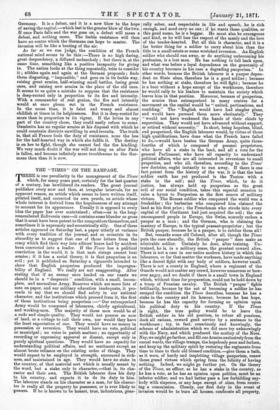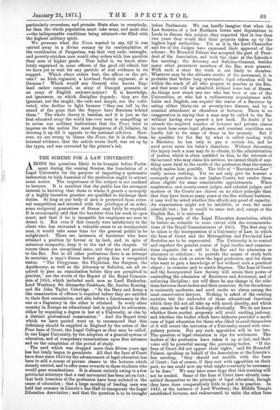THE " TIMES " ON THE RAMPAGE.
THERE is one peculiarity in the management of the Times which, for many years past, certainly for the last quarter of a century, has bewildered its readers. The great journal publishes every now and then, at irregular intervals, for no apparent reason, an article which seems to have written itself, printed itself, and corrected its own proofs, an article whose whole interest is derived from the hopelessness of any attempt to account for its appearance. Usually it is opposed to every idea the paper has ever maintained ; often—as in the long- remembered Zollverein case—it contains some blunder so gross that it must have been patent to the compositors themselves, and sometimes it is supremely and eccentrically silly. One of these articles appeared on Saturday last, a paper utterly at variance with every tradition of the journal, and so eccentric in its absurdity as to suggest that one of those letters from the crazy which find their way into editors' boxes had by accident been converted into a leader. If the Times has a political conviction in the world, it is that mob risings cannot beat armies ; if it has a social theory, it is that pauperism is an evil ; yet it published on Saturday a rigmarole intended to show that English pauperism produced the impregna- bility of England. We really are not exaggerating. After stating that if an enemy once landed on our coasts we should be in a " desperate " condition, with a small, incom- plete, and anomalous Army, Reserves which are mere lists of men on paper, and our military education inadequate, it pro- ceeds to say that we should find safety in our national character, and the institutions which proceed from it, the first of those institutions being pauperism :—" Our extemporized Army would be composed of labourers, chiefly agricultural, and working-men. The majority of these men would bo of a rude and simple quality. They would not possess an acre of land, or a cottage to call their own, nor would they have the least expectation of one. They would have no money in possession or reversion. They would have no .vote, political or municipal ; no voice in parish matters ; no opportunity of recording or expressing approval or dissent, except only in purely spiritual questions. They would have no capacity for understanding political affairs, and no sentiment except an almost brute reliance on the existing order of things. They would expect to be employed in strength, succoured in sick- ness, and maintained in age. They would have no stake in the country, of that material sort which is usually meant by the word, but a stake only in character,—that is, its cha- racter and their own. The British labourer does his duty to his country, and expects it to do its duty to him. The labourer stands on his character as a man, for his charac- ter is really all the property he possesses, or is ever likely to possess. If he is known to be honest, true, industrious, gene- rally sober, and respectable in life and speech, he is rich enough, and need envy no one ; if he wants these qualities, or this good name, he is a beggar. He must also be courageous and kind, or he will lose the respect of the manly and the love of the tender-hearted. But all this is character, and it is a far better thing for a soldier to carry about him than the title to a small estate or some wretched reversion. An English soldier who should run away, or do anything unbecoming his profession, is a lost man. He has nothing to fall back upon, and what was before a loyal dependence on the generosity of his country becomes in his case a degrading pauperism." In other words, because the British labourer is a pauper depen- dent on State alms, therefore he is a good soldier ; because he has nothing at stake, therefore he will fight ; because he is a boor without a hope except of the workhouse, therefore he would rally to his leaders to maintain the society which leaves him in that position. Moreover, because of pauperism, the armies thus extemporized in many centres for a movement on the capital would be " united, pertinacious, and confiding." The "English would have had simpler plans, and would have pursued them more obstinately." They " would not have weakened the hands of their chiefs by supervision. They would not have advanced without support, or retired without necessity." In short, being hopeless, blind, and pauperized, the English labourer would, by virtue of those high qualifications, have done what the French have failed to do,—would have beaten the German Army, quite three- fourths of which is composed of peasant proprietors, who have all a stake in the land, and all a vote for the general Parliament, who have all capacity to understand political affairs, who are all interested in reversions to small properties, and who all, therefore, according to the Times' new doctrine, ought instantly to run away. If there is one fact patent from the history of the war, it is that the best soldier earth has yet produced is the Teuton with a stake in the soil ; and the Times, which, to do it justice, has always held up pauperism as the great evil of our social condition, takes- this especial occasion to raise a hymn to Pauperism as the first source of military virtues. The Roman soldier who conquered the world was a freeholder ; the barbarian who conquered him claimed the land as his first prize ; the Frenchman who strode into every capital of the Continent had just acquired the soil ; the one unconquered people in Europe, the Swiss, scarcely reckon a pauper as a man ; and the German, who is claiming the mastery of Europe, is the typical peasant-proprietor ; but the British pauper, because he is a pauper, is to subdue them all!
But, remarks some old Colonel, after all, though the Times puts the case absurdly, the British " pauper " does make an admirable soldier. Certainly he does, after training. Un- trained, he is, in a military sense, the greatest coward alive. There is not a case in our entire modern history in which the labourers, or for that matter the workmen, have made anything like a decent fight with any body of soldiers, however small. There is not a county in England, where a regiment of the Guards would not scatter any crowd, however numerous or how- ever angry, and we doubt if there is a small town in England which, without time for preparation, could not be held down by a troop of Prussian cavalry. The British "pauper" fights brilliantly, because by the act of becoming a soldier he has escaped the condition the Times describes, because he has a stake in the country and its honour, because he has hope, because he has the capacity for forming an opinion upon his political duty to his country. If the Times is right, the true policy would be to leave the British soldier in his old position, to refuse all pensions, dock all rations, reward good service by a sentence to the workhouse ; try, in fact, consciously and knowingly, the scheme of administration which we did once try unknowingly with the Navy, and which produced the mutiny of the Nore. Nay,we might go farther, and fill ourArmies exclusively from the casual wards, the village tramps, the hopelessly poor and forlorn, and keep upthe military spirit by restoring the regiments from time to time to their old blessed condition,—give them a bath, as it were, of hardy and inspiriting village pauperism, renew those grand virtues which spring from the felicity of having nothing. Indeed, we might go further yet. On the theory of the Times, an officer, as he has a stake in the country, as he has a vote, as he has an opinion upon politics, must be an inferior soldier, and we had better pass a law forbidding any- body with sixpence, or any hope except of alms, from receiv- ing a commission. Clearly, our first duty in the event of invasion would be to burn all houses, confiscate all property, particularly reversions, and promise State alms to everybody, for then the whole population must take arms, and must also —the indispensable conditions being attained—be filled with the highest military spirit.
We presume what the limes wanted to say, till it was carried away in a divine ecstasy by its contemplation of the excellencies of Pauperism, was that very rude, untaught, and poverty-stricken men would obey orders with less question than men of higher grade. That belief is, we know, abso- lutely engrained in some officers of the good old school, but we have yet to wait for any particle of real evidence in its support. Which obeys orders best, the officer or the pri- vate an Irish regiment, a Lowland Scotch regiment, or a German ? Which would any General who knows Eng- land rather command, an army of Donegal peasants or an army of English serjeant-majors I It is knowledge, not ignorance, on which discipline depends ; they are the ignorant, not the taught, the rude and simple, not the culti- vated, who decline to fight because " they can tell by the sound of the guns that the Sepoys have Russians behind them." The whole theory is baseless, and it is just as the best educated army the world has ever seen is compelling us to revise our military institutions that the Times tries to impress on the nation the most dangerous of all fallacies, by dressing it up till it appeals to the national self-love. How- ever, we are wrong to blame the Times, for it is clear, from internal evidence, that the article wrote itself, was set up by the types, and was corrected by the printer's ink.































 Previous page
Previous page